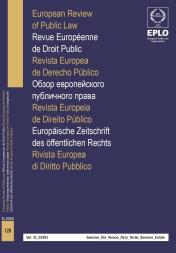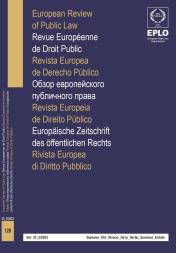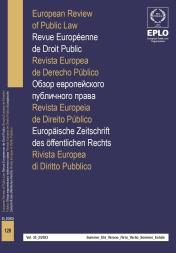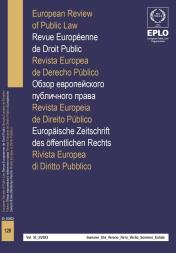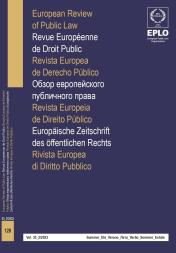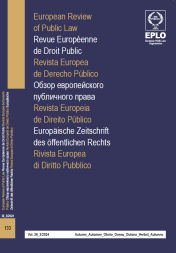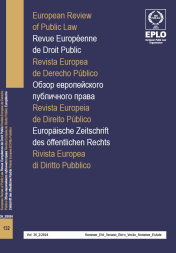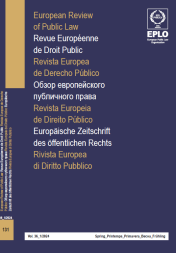
ERPL
Vol. 35, no 2, summer/été 2023 (128)
Developments from the viewpoint of diverse jurisdictions and on topical issues are presented in this ERPL issue.
The first article deals with the infringement procedure in the European Commission, by which it can bring legal actions against Member States that do not comply with EU law. Using direct taxation as a case study, this article maintains that infringement actions are based on value choices on the matters and actors that should be privileged when ensuring compliance with the EU legal order, and that these choices can have distributional policy consequences. The article concludes that more transparency may be needed for the public to understand the reasons behind the Commission's litigation priorities, and such priorities may have to be reconsidered for the EU legal order to benefit all its subjects equally.
The next article presents the right to private and family life as a cornerstone of human rights protection and is particularly focused on the main features and current disputable issues of its constitutional protection in the Czech Republic as an example of an EU Member State since 2004 with democratic transition experience since 1989. The article describes the national constitutional law provisions as well as their reflection in the recent European Court of Human Rights case law. Through the perspective of some selected influential cases, the shared views of the national and international human rights judicial protection are traced.
The third article aims to shed light on how the right to privacy is protected within the Italian jurisdiction. In order to achieve this goal, first of all, the history of the right to privacy in Italy and its current regulation are briefly described; subsequently, an attempt is made to comprehend to what extent supranational human rights law has influenced and still influences its level of protection; finally, some recent jurisprudential rulings are examined with a view to understanding how it is safeguarded in practice. The study shows that although the level of protection of the right to privacy ensured by national case-law appears satisfactory, the protection of the relevant right will always have to evolve since the issue of privacy is linked to rapidly evolving phenomena.
Last but not least, the final article in this section maintains that the arrival of Artificial Intelligence (AI) to the copyright field has brought ancient debates about the classic dichotomy of moral and economic rights in this arena and focuses on the need to address the issue of whether moral rights are still the suitable way of protecting copyright in the AI era or if we should move to more objective and economic points of view (far from the romantic conception of the author). The key point is: is it possible to dissolve moral rights (or, at least certain moral rights) in economic rights? Is it the best path to provide answers to the deep challenges that the AI brings? What is obvious is that we can no longer look the other way.
In the section of Chronicles of Constitutional Law, the chronicle coming from Cyprus examines a 2022 Amendment to the “Law on Control of Employment Entry in the Private Sector”, which requires retired judges, the Attorney General and Assistant Attorney General to obtain Special Committee approval before taking private sector employment within two years of retirement. On this Amendment the President of the Republic of Cyprus sought the Supreme Court’s opinion as to whether the inclusion of judges within the scope of this 2022 Amendment violated a constitutional provision designed to shield judges from adverse changes in their remuneration and service conditions following their appointments. It was concluded that the challenged law does not conflict with the Constitution, the Treaty, the Charter, or the doctrine of the separation of powers.
The chronicle on the Constitutional Law of Georgia deals with the freedom of expression, which is not an absolute right, but it is one of the fundamental and important levers for the development of a democratic society. Although it has scope for limitation, the state must be careful in applying these limits. The practice of the Constitutional Court of Georgia also shows that the right should be restricted based on the principle of proportionality, which should serve to achievea legitimate goal. The fact that states are developing and becoming more accepting of different opinions should be positively evaluated, therefore, over time, fewer cases of illegitimate restriction of expression of opinion are recorded. Also, society should understand that the content and form of this right’s expression is very important. Accordingly, for the development of a democratic society, both the state and the citizens must take care and protect the content, form and scope of the freedom of expression.
The third chronicle of Constitutional Law, coming from Italy, first refers to the re-election of President of the Republic Sergio Mattarella for a second term at the beginning of the year 2022 and the developments leading to his re-election. It then examines the government’s political crisis which came a few months later and which was brought about in particular by the unavailability of the Movimento 5 Stelle (M5S) to continue supporting government action on some specific points. In the light of the resulting elections, the Head of State has given Giorgia Meloni, leader of Fratelli d’Italia, the task of forming the government. This is the first time in the history of Italy that a woman has been appointedPrime Minister. As concerns the executive’s action, it was in the first months focused on measures aimed at countering the economic and social impact of inflation and the energy crisis on families and businesses. Finally, during the year, a referendum was held on five questions concerning justice, for which, however, the quorum was not reached.
Last but not least in the section of Constitutional Law chronicles, the Chronicle from the Netherlands first presents the numerous constitutional challenges still posed in 2021 and 2022 by the COVID-19 pandemic: The Temporary Corona Act raised questions of a democratic nature while on a more structural level, the pandemic highlighted the inadequacy of the Dutch system of emergency law, which is outdated and in need of revision. The chronicle then goes on to examine the Childcare benefit scandal, which put the spotlight on other deficiencies in the Dutch constitutional system. After the 2022 elections the primary responsibility to take up these challenges was entrusted to the new Cabinet Rutte IV, that took office after the longest process of cabinet formation in Dutch parliamentary history. On the judicial level, the courts adjudicated cases regarding the compatibility of tax legislation in light of human rights standards, the legality of important Covid-19 measures and (more exceptionally) a noteworthy intra-parliamentary conflict. Also, a large number of amendments passed through the rigid amendment process, including a new ‘general provision’, amendments to fundamental rights (such as the right to non-discrimination) and changes to the amendment process itself.
The first chronicle in the section of Chronicles of Administrative Law, coming from Brazil, examines innovations in Administrative Law in Brazil in 2022, including the proposed Administrative Reform that has provoked intense debate in Congress and which addresses issues such as public-private partnerships, performance evaluation, reducedworking hours and other changes to the rules of stability in the public sector. In 2022, the Congress enacteda record 14 constitutional amendments, including those related to Administrative Law, such as the Benefits PEC. These amendments also touched on areas such as data protection, taxation and the rights of community health workers. In addition, there were relevant decisions by the Federal Supreme Court (STF), for example with regard to the Administrative Improbity Law or the classification of civil servants hired without a public tender before 1988. Finally, the Superior Court of Justice (STJ) approved a settlement in an administrative improbity case that was already at the appeal stage.
The second Administrative Law chronicle, coming from France, confirms that the administrative jurisdiction finds again a more ordinary activity in 2022 after a year 2021 marked by the litigation of the health crisis linked to the COVID-19 epidemic. The Council of State has thus had the opportunity to clarify several principles originating from its previous jurisprudence, notably on the question of the office of the judge hearing cases of misuse of power, which is still being modified. With this regard, the recent decisions confirm the growing interest shown by the French administrative judge in the practical effects of his decisions. This interest sheds light on the novel answers given by the Council of State to questions raised by the contemporary challenges of administrative action. This is the opportunity for the judge to issue more remarkable decisions on the environment, secularism or access to public services.
Going on to the section of Jurisprudence, the chronicle on French Constitutional Jurisprudence analyzes the decisions of the Constitutional Council issued during the year 2022. This year has been particularly marked by the presidential and legislative (National Assembly) elections but also by the appointment of three new members to the Constitutional Council. The latter has furthermore adopted Internal Rules of Procedure within the framework of its procedure of a priori control of legislation.
This ERPL issue is concluded by the section of Book Reviews, in which a chronicle reviewing some of the most important publications in Italy in the field of Public Law in the year 2022 is published.
Summary
Articles
L. Díez Sánchez, Infringement Actions and Social Change: The Distributional Impact of the Commission’s Litigation Powers [IN ENGLISH] (32 pp.)
S. Brožová, The Right to Private and Family Life in the Czech Republic and its Constitutional Protection [IN ENGLISH] (22 pp.)
M. Paladino, The Right to Privacy under the Italian Jurisdiction [IN ENGLISH] (16 pp.)
M. Ortego Ruiz, Artificial Moral Rights in the AI Era [IN ENGLISH] (20 pp.)
Chronicles
I. Constitutional Law
M. Michaelidou-Kyriacou, Cyprus [IN ENGLISH] (8 pp.)
A. Imedashvili, Georgia [IN ENGLISH] (13 pp.)
Ch. Martini / F. Tedde, Italy [IN ITALIAN] (38 pp.)
M.J. Vetzo, The Netherlands [IN ENGLISH] (20 pp.)
II. Administrative Law
M. de Paula Silveira, Brazil [IN PORTUGUESE] (18 pp.)
V. Laugier, France [IN FRENCH] (19 pp.)
III. Jurisprudence
M. Heitzmann-Patin / M.-O. Peyroux-Sissoko, ConstitutionalJurisprudence, France [IN FRENCH] (42 pp.)
Book Reviews
S. Franca [IN ITALIAN] (18 pp.)



















